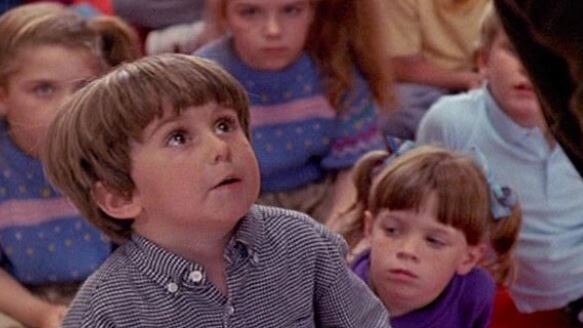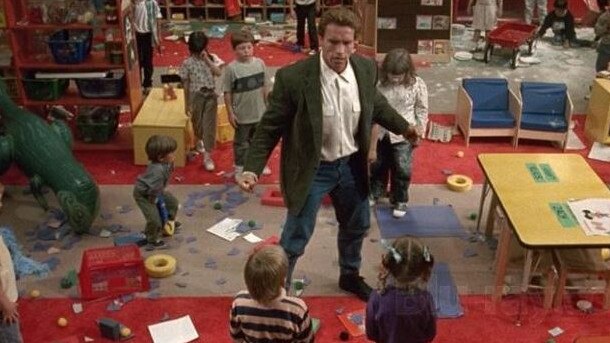World full of beige-coloured clones? Why we need to keep gender-neutral obsession in check | Rebecca Whitfield-Baker
Referencing gender in 2023 has become a weirdly controversial space where “boys” and “girls” have sadly become words to avoid, writes Rebecca Whitfield-Baker.
Opinion
Don't miss out on the headlines from Opinion. Followed categories will be added to My News.
“Boys have a penis, and girls have a vagina”. Who can forget the memorable movie line uttered by an adorable preschooler to oversized, hard-hitting Detective John Kimble, aka Arnold Schwarzenegger, in the 1990 hit movie Kindergarten Cop?
His little classmates snicker and it’s impossible not to giggle along with them, the moment perfectly catching kids’ delightful unpredictability, randomness – and sense of fun.
Fast-forward 30-odd years (yes, really it has been that long) and it’s unlikely the innocent line would make the cut; it’s not so much the anatomy references that would warrant the bleep button but rather the words “boys” and “girls”.
For, it seems referencing gender in 2023 is a no-go zone; a weirdly controversial space despite the fact there are – and have always been – boys and girls, men and women, who come in all shapes and sizes, with individual tastes and preferences, likes and dislikes.
Somehow, gender-specific talk has become a four-letter word.
“Progressive” schools are proudly promoting gender-neutral toilet blocks, while there are calls by some to scrap altogether gender-based labels such as “boys” and “girls” from school bathrooms, or when referring to students.

We learned during the week “gender-specific terms including he, she, him and her will be removed from state parliament’s rules of procedure”.
“It follows recommendations by a parliamentary committee to switch to language that is neutral of gender and sexual identity,” writes Advertiser state political reporter Kathryn Bermingham.
“The changes, which have been adopted after a review of the Lower House standing orders, will replace gendered pronouns with they, their and them.”
There are plenty who’ll argue times are a-changing and we ought to stop being dinosaurs and get on board and embrace new-age language.
Yes, language trends change. Yes, we do need to grow and evolve as a society, and to learn from the experience of others, to be empathetic and respectful.
What’s considered right and polite in one era doesn’t necessarily flow to the next.
Growing up, we’d almost always refer to friends of our parents as “Mr and Mrs”. These days it’s rare for my kids’ mates to call me anything other than a shortened version of my first name – or “Mummy Bakes” if they are feeling cheeky.
But there doesn’t seem to be much wriggle room nor middle ground when it comes to referencing gender; it’s gender neutral all the way, or risk being cast aside as a Neanderthal-like, proud-to-be-man-or-woman fossil.
Seriously, with so many issues worthy of attention, whether you identify as male or female, or something in between, surely isn’t the most pressing in terms of our state or national agenda?
Too many kids in this “lucky country” are living shocking existences, including enduring vile abuse, with an estimated 46,000 now in “out of home care” around the country.
(If you need a face, think of Zhane Chilcott, the South Australian boy with the gorgeous smile at the centre of a recent coronial inquest. He spent most of his life in foster care, shuffled around to 18 different homes before taking his own life, aged just 13.)

Mental health conditions are increasing with the Black Dog Institute finding more than 40 per cent of year 12 students report elevated symptoms of anxiety and depression, while suicide remains the leading cause for death in people aged five to 17 years old.
There’s appalling homelessness – Mission Australia reports every night in Australia there are 122,000 people without a safe and secure home – which is only set to worsen as the cost of living escalates; a “loneliness epidemic” (KPMG finds five million Australians are impacted by loneliness with young adults, aged 18 to 24, at particular risk) and we’ve an ongoing aged-care crisis.
Of course we’ve learned gender can play into each of these issues and if individuals identify a particular way, and ask to be addressed a certain way, this ought to be accommodated with basic humanity and respect.
But we need to be looking at the bigger picture. How do we get more young people engaged and involved in the community and exposed to good role models through being part of sports clubs, youth groups, dance troupes, musical ensembles and art centres … things that interest them and get them involved face-to-face with like-minded people?
Let’s strive to be inclusive, to embrace – and celebrate – our wonderful differences but keep the gender-neutral obsession in check: what fun really is a world full of beige-coloured clones?





